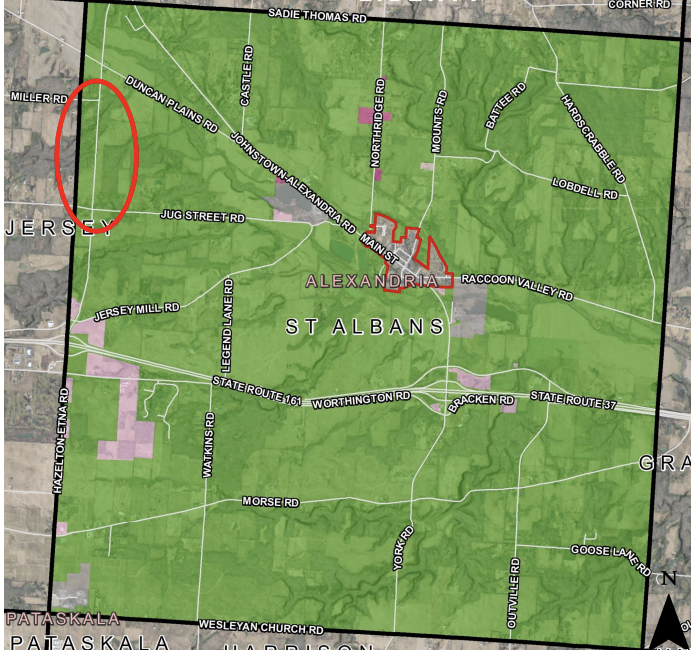Against their own staff recommendations and despite pushback from a large audience, members of the Licking County Planning Commission voted to support rezoning requests across 306 acres of land in St. Albans Township.
More than 40 people filled chairs in the Licking County Transit headquarters on East Main Street in Newark – the temporary home for the planning commission while its usual meeting place is being used as a temporary courtroom – for a meeting that extended late into the evening on Monday, Aug. 26.
Many of those in attendance were St. Albans Township residents, there to call on the planning commission to vote against six resolutions to rezone the township farmland along State Route 310 and western parts of the township from agricultural use to general business or manufacturing use.
Of the six rezoning proposals, only one – the proposed rezoning of a 3-acre parcel along Legend Lane Road – was denied in a “non-binding decision,” according to commission chair Randall Bishop.

While several of the proposals were for small plats of land, between one and three acres, three of the proposals were for large properties, including a 72.5-acre property, a 91-acre property and a 135.65-acre property. The scattered sites are generally in the Rt. 310 and Rt. 161 corridors between Rt. 310 and Rt. 37. Landowners say they don’t have any specific development plans at this time.
The St. Albans Township Zoning Board will hold a special meeting at 5:30 p.m. today, Aug. 27, at the township fire house in Alexandria to discuss the planning commission’s recommendation.
The 91-acre property rezoning, put forth by St. Albans Township Fiscal Officer Bridgett Reeves and her husband Kevin, was the first proposal in a string of St. Albans-related rezonings heard by the commission.
Initially, the county planning staff recommended the commission deny support of the resolution – even if it seemed “logical” to approve it.
“There are factors that were described in the staff report that make it seem logical, given that it’s on a good roadway that could handle commercial traffic, being the state route, and it does match the future land use map,” explained Jay Fisher, the assistant planning manager and special projects planner at Licking County Planning and Development.
Despite that, Fisher said, “Factors such as potential spot zoning, no water [and] sewer, no planned use for the property – those are some of the facts that [led staff to recommend] denial.”
Kevin Reeves, who attended the commission meeting, acknowledged the lack of a planned use for the 91-acre swath, but said St. Albans doesn’t require a planned use to rezone.
“We can honestly state that we have no plans [for commercial development] at this time,” he told the commission. “Our plans are to continue to farm.”
Rob Platte, township administrator in neighboring Jersey Township, said the 91 acres abuts Jersey Township land where the community is already planning for commercial development in advance of Intel’s operations.
“There will be commercial and retail-type development north of these parcels that are being asked for this,” Platte said. “It’s in alignment with their [comprehensive] plan and with ours.”
Even so, other St. Albans Township officials are concerned about rezoning the Reeves’ property – in part because of a moratorium on zoning changes in the township.
Leaders in the community, including members of the St. Albans Board of Trustees, for which Bridgett Reeves serves as the fiscal officer, are working to “modernize” zoning codes to “encourage smart and sustainable development,” said Bruce Lane, Board of Trustees president.
“It is my opinion that these property owners are trying to sneak changes in before zoning is reformed in the township,” he added. “Spot zoning these properties will disrupt our long-term comprehensive plan efforts. This can lead to a fragmented development that does not align with the community’s overall goals.”
Lane also contends that rezoning the Reeves’ property could be seen as “corruption.”
“It can be seen as favoritism for specific property owners or developers, leading to questions of fairness and even to potential corruption,” he said. “When zoning changes are made for individual parcels, it may give special benefits to one owner at the expense of others.”
Despite pushback from the community, commissioners voted to approve the resolution and four of the remaining five rezoning proposals, citing the St. Albans comprehensive plan. The plan, updated in 2022, shows the five parcels as being designated for commercial use, meaning rezoning them would put them in line with township planning. Support for the sixth proposal, for three acres on Legend Lane Road, was denied because it doesn’t match the 2022 comprehensive plan.
But approval or denial of these plans doesn’t mean property owners can move ahead with commercial development tomorrow.
The “non-binding decisions” from the commissioners are merely recommendations to township zoning boards.
The county planning commission and planning staff “give us their comments in the staff report that we can look at,” but “the ultimate say to these decisions comes down to the [township] trustees,” explained St. Albans Township Zoning Inspector Woody Fox. “At the end of the day, it’s just a recommendation.”
Fox said the planning commission and staff do “a great job” in Licking County, but “zoning is sometimes difficult to sift through, and every community is different. It’s not cookie cutter.”
Julia Lerner writes for TheReportingProject.org, the nonprofit news organization of Denison University’s Journalism program, which is supported by generous donations from readers. Sign up for The Reporting Project newsletter here.

